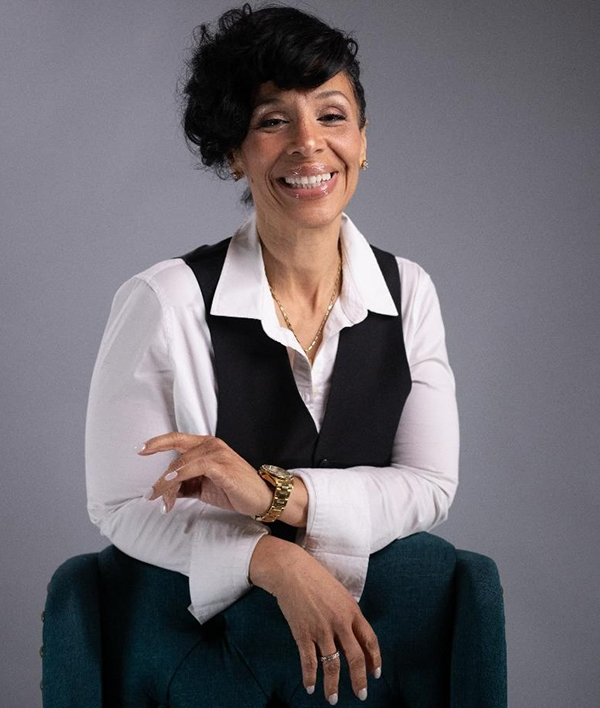Tamaira Sandifer
By Darlene Donloe
Contributing Writer
The story of Tamaira “Miss Tee” Sandifer and Studio T Arts & Entertainment, a national nonprofit based in Sacramento, is a testament to the transformative power of creativity and entrepreneurship.
Growing up in Oakland, as one of six siblings raised by a single mother on welfare, Sandifer experienced firsthand the challenges of poverty and limited opportunities.
However, Sandifer, 51, called “Miss Tee” by her students, refused to let her circumstances define her. Instead, she channeled her energy into dance and the arts, eventually founding Studio T Arts & Entertainment in 2005.
Sandifer said the organization “unofficially” started in 2000.
“I didn’t have a program like this when I was growing up, which is why I wanted to do it,” said Sandifer, whose influence has reached a national audience. “I didn’t know I was doing something until 2005. All I knew was that I wanted to help people. I knew there was a way to reach our kids. I felt like I could make a difference.”
Studio T began as a small hip-hop dance class in a Sacramento park and has since evolved into a thriving nonprofit organization, serving more than 880,000 youth nationwide.
“Our students start their own businesses, graduate from high school, and go on to work with artists like Usher, Beyoncé, Drake, and so many others, or at the Super Bowl, that’s the real victory,” Sandifer said. “It proves that creativity can be the bridge from poverty to prosperity.”
Sandifer’s vision was, and continues to be, to empower underserved youth through arts education, entrepreneurship and social-emotional learning.
“This organization is important because of our cultural equity,” Sandifer said. “It’s different. I can weave things into a class because I work with people who have that equity. Dealing with the trauma of life. We can speak a language and offer a practice and win from wherever they are.”
Sandifer said cultural equity is important because “it feeds the industry of entertainment.”
“It adds to the industry through movies, sports, fashion, a dialect, anything,” she said. “The community thrives creatively. I disagree with the idea that you have to go to college. No, you don’t. You can still be happy and successful.”
While she doesn’t have a measuring stick for the program’s success, Sandifer said she assesses it mainly by “how our kids and their parents are showing up.”
“Success may be that they got an A in math,” she said. “Somewhere we did something right to build that person’s confidence. Graduating from high school, getting into college. Sometimes, just getting a third meal is successful. We measure success in line with how people are showing up every day.”
Her approach has been recognized with numerous awards, including the Forbes Culture 50 Champion and the California Legislative Women’s Caucus Woman of the Year Award.
Sandifer’s work is particularly significant in the context of systemic inequality and poverty in Black communities. She doesn’t have to look at statistics. Sandifer said she can look at her own life.
“I hated the fact that I had to fight cockroaches and mice for the same resources,” she said. “Standing in a welfare line. I said to myself that I wouldn’t live this way, and that I didn’t want my kids to, either.
“I wanted to show up in the world as someone who had a solution. My mom did the best she could. She tried. She never quit. She went back to college and got a degree. If she can do that, I can do better.”
As someone who has lived through the challenges of poverty, Sandifer wants policymakers and community leaders to understand the impact of cuts to federal assistance programs on Black households and children.
“I find that sometimes yes, those programs are critical and important,” she said. “I was on government assistance for two-thirds of my life. It creates an unrealistic dependency.
“As long as you come up with programs that require standing in line, they enable people in ways that don’t allow them to tap into their talents. It should be a step that leads to the next one. As leaders, they should be asking us questions. We should be willing to say something.”
Sandifer sees the arts and entrepreneurship intersecting to create pathways out of poverty for today’s youth. By providing access to arts education and entrepreneurship training, Studio T helps young people break free from cycles of poverty and achieve economic mobility.
“The arts give people the necessity of creativity,” she said. “People are so dependent on being told what to do and what to think. People need to know what to wear — how to dress.
“When they are thrown a curveball, it stumps them,” Sandifer added. “What do you want? They know what Kim Kardashian and others want, but what do they want?”
In that vein, the organization’s programs focus on building confidence, creativity and critical thinking skills, enabling youth to become positive change-makers in their communities.
Studio T’s impact extends beyond individual youth to entire families and communities.
The organization’s programs include financial literacy, life skills training, and vocational development, empowering parents and caregivers to support their children’s success.
Studio T’s approach to arts education and entrepreneurship is unique and has evolved over the past 25 years.
“The uniqueness is fueled from the heart of a woman who can relate and put in the work and effort,” Sandifer said. “The staff and I speak and teach from experience. We guide and teach so that you can climb out from the bottom of the barrel. You can be violently different.”
Sandifer’s own experience as a single mother has informed her approach, ensuring that Studio T’s services are accessible and responsive to families’ needs.
Sandifer admits that families are facing pressing needs and that the community and policymakers should support them.
“We are approaching 60% with our single-parent households,” she said. “Single Black grandmas, dads of color, and more. When you have to work a job and raise kids, it’s the density of the society we live in.
“We have kids who learn differently. Sometimes they are difficult. They are misunderstood, or they learn differently,” she continued. “You’re dealing with young adults who grew up with the internet and social media. I try hard to stay ahead of the curve.”
Studio T’s innovative initiatives include a distance-learning platform, the Side Hustle Academy, which teaches youth and adults how to turn their creative gifts into sustainable businesses; Innovation Factory, a 36,000-square-foot facility in Sacramento providing modern arts and technology education spaces; and an upcoming mobile app. The programs focus on building confidence, creativity and critical thinking skills, enabling youth to become positive change-makers in their communities.
Sandifer’s legacy is one of empowerment, resilience, and community transformation.
As Studio T expands nationwide, she remains committed to making a meaningful difference in the lives of young people.
“There will be a big gala on January 24, 2026,” said Sandifer, who works in juvenile halls. “The gala will bring together national leaders and sponsors with our outstanding students. I purchased four city blocks where we offer podcast studios, salons, a dance studio, and a culinary arts kitchen.
Our community can show up. I’m building that out. There will be three more similar organizations opening in Fresno, Tulsa and Atlanta. There will be board and care.”
Through Studio T Arts & Entertainment, Sandifer continues to inspire and uplift youth, families, and communities, demonstrating the power of creativity and entrepreneurship to drive social change.
“I see you,” Sandifer said. “You can be what you want to be. What do you want? Let’s go!”
Darlene Donloe is a freelance reporter for Wave Newspapers who covers South Los Angeles. She can be reached at ddonloe@gmail.com.




